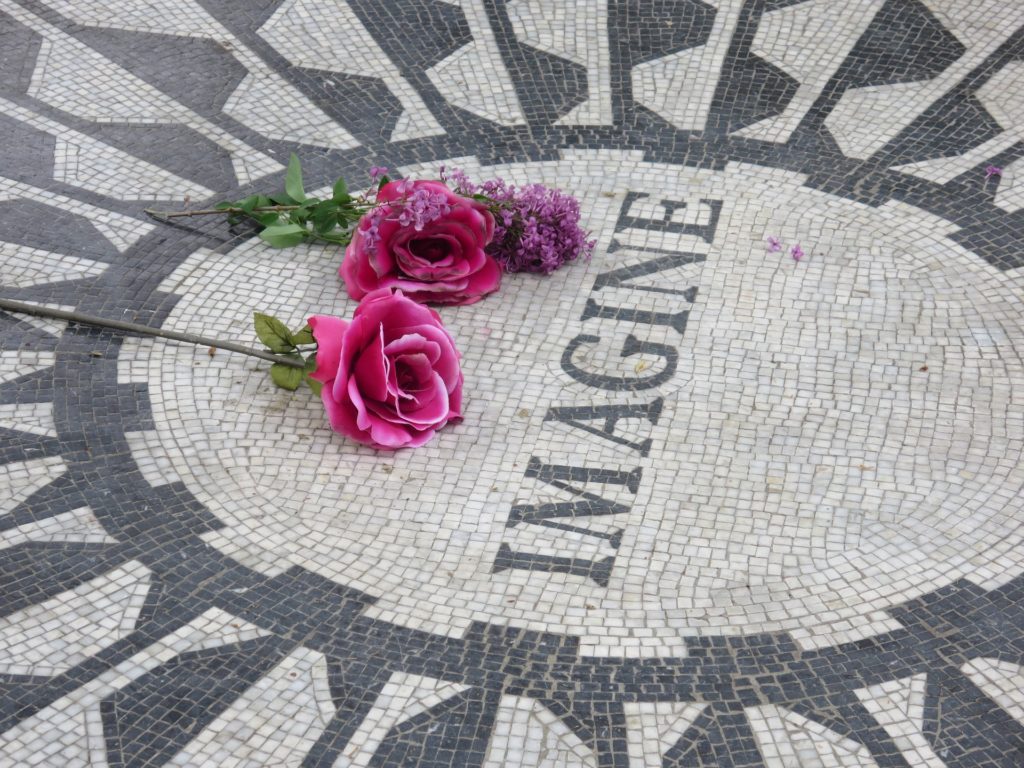
#TBT is about looking back, maybe even getting a touch nostalgic. Today’s trip back to the not-too-distant past is a moving one. Just two years ago on this day on December 8, 2020, it was a major day of remembrance for me and millions around the world.
We were also marking the end of Year One of the COVID pandemic, with no clear end in sight. Just a few days later, that first shipment of Pfizer vaccines would ship down the road from me in Kalamazoo, Michigan. It would turn out to be just the beginning of the end, but still an important moment.
The death of John Lennon on this day – 42 years ago – rocked my world, like suddenly losing a relative or a good friend. And today’s #TBT post is a trip more than four decades ago to that fateful hard day’s night. In some ways for me, it was the day the music died – or at least its mortality got all too real.
Like every day these days, today will be another day in the news cycle – the economy, missing documents, a faraway war, court cases and trials, and sadly, a good chance for more senseless killings like Lennon’s way back on a crispy, cool night in New York City more than four decades ago.
John was a complicated man. But also simple at the same time. At the time of his death, his and Yoko’s period of enlightenment here in the U.S. seemed to be blossoming. All the while, he seemed to be trying to convince us that “love is all you need.”
If you get a moment, listen to some Lennon and his Fab Four band today. Hopefully, you’ll hear a few songs on the radio today. My playlist appears at the end of this post. There’s a lot to choose from. – FJ
Here’s a story I haven’t told before in this blog.
On the 40th anniversary of the assassination of John Lennon, it seems like a good time to tell it.
On this date in 1980, I had recently moved to New York City, working for ABC Radio (the Owned FM Group). I had been transferred from WRIF in Detroit that spring. Having never lived in Manhattan, I wanted to be in the city, and found an apartment on W. 73rd Street and Central Park West.
The reason that’s significant is that one block over, the famous Dakota condo building loomed large over Central Park – home to many celebrities from all walks of life, including John and Yoko. Over the years, Boris Karloff, Rosie O’Donnell, Judy Garland, Joe Namath, and scores of other famous names took up residency in the Dakota.
The horror film, Rosemary’s Baby, was set there – the perfect location and look for a building that loomed over the Upper West Side landscape, even as taller structures were built nearby.
I became fascinated by the Dakota, walking past it several times each day on my way to and from work. And always wondering what rock n’ roll’s #1 power couple were up to. I never did spot either John or Yoko on the street, but they both freely moved about the city, along with millions of their neighbors.
Just a couple months into my adventure in NYC, I started reading books about the Dakota. It turned out the building had a rich history. It got its name because when it was built 100 years earlier in 1880, W. 72nd Street was thought to be way out in the middle of nowhere – like the Dakotas. And the name stuck.
One of my favorite books was a great sci-fi novel Time and 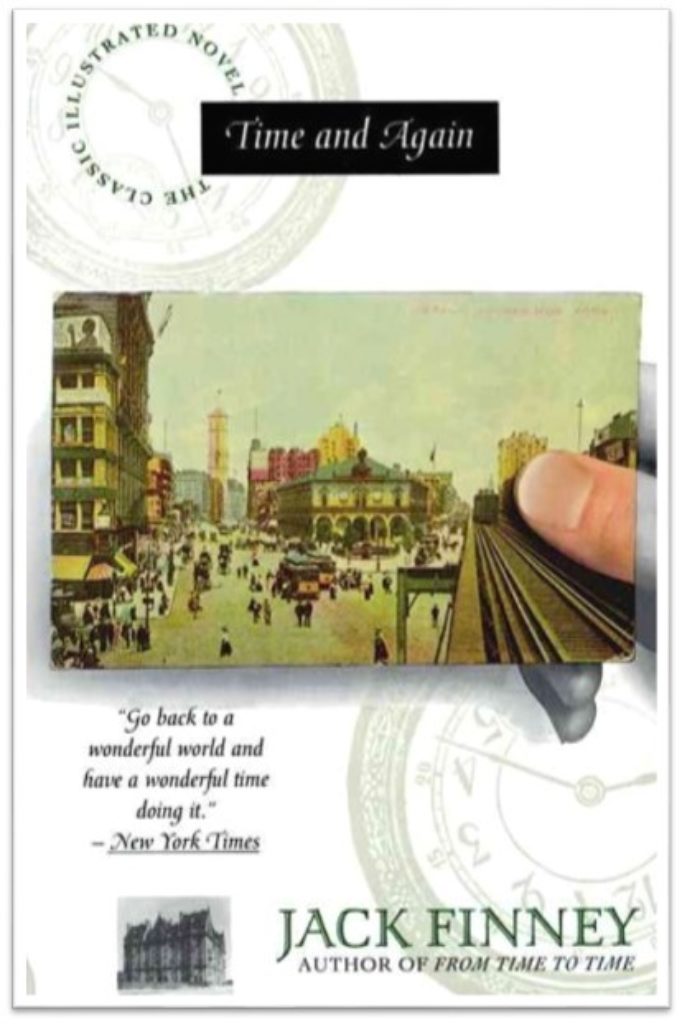 Again, by the great Jack Finney (also author of The Body Snatchers that turned into a couple of hit films adding “Invasion of…” to the title).
Again, by the great Jack Finney (also author of The Body Snatchers that turned into a couple of hit films adding “Invasion of…” to the title).
It’s a wonderful story about how a modern-day New Yorker goes back in time by sitting in a special apartment in the Dakota and looking down on Central Park. He is swept back to the era when the landmark was first built – an exciting adventure that gave readers a feel for what Manhattan was like a century earlier.
I read another book about the history of the Dakota, as well as TV and news stories about what life was like for John and Yoko as perhaps the most famous citizens of the city in 1980.
John’s “comeback” album, Double Fantasy, had just been released, so he was already in the news and on the radio.
So, fast-forward to the night of December 8, 1980 – and I’m in my apartment watching “Monday Night Football.” And in the middle of the game, ABC sports guru Howard Cosell breaks in to deliver the tragic news Lennon was just shot outside his home.
I opened my window and heard the sirens.
I then turned on the radio, and both WPLJ and WNEW-FM – the two big rockers – were just getting the news, scrambling to get the story on the air. And then I started thinking about ABC’s sister stations around the country. If you weren’t watching TV at that moment, there was no Internet, Twitter, or push notifications to get the word out. It was very fresh news.
I had a special company phone in my apartment (in addition to my landline) that allowed me to direct dial any of ABC’s seven owned FM stations. They installed it so I could monitor the stations on “listen lines” that were provided for company managers and consultants.
My first call was to WRIF where I spoke with Carl Coffey who was on the air at that time. I gave him the details as I had heard them (sketchy, as you might imagine), and called other stations as well.
The next morning, I got the call from Jim Johnson, host of “J.J & The Morning Crew,” the big morning show at WRIF during those days.
I did a call with them, and offered to walk over to the Dakota to see what was going on.
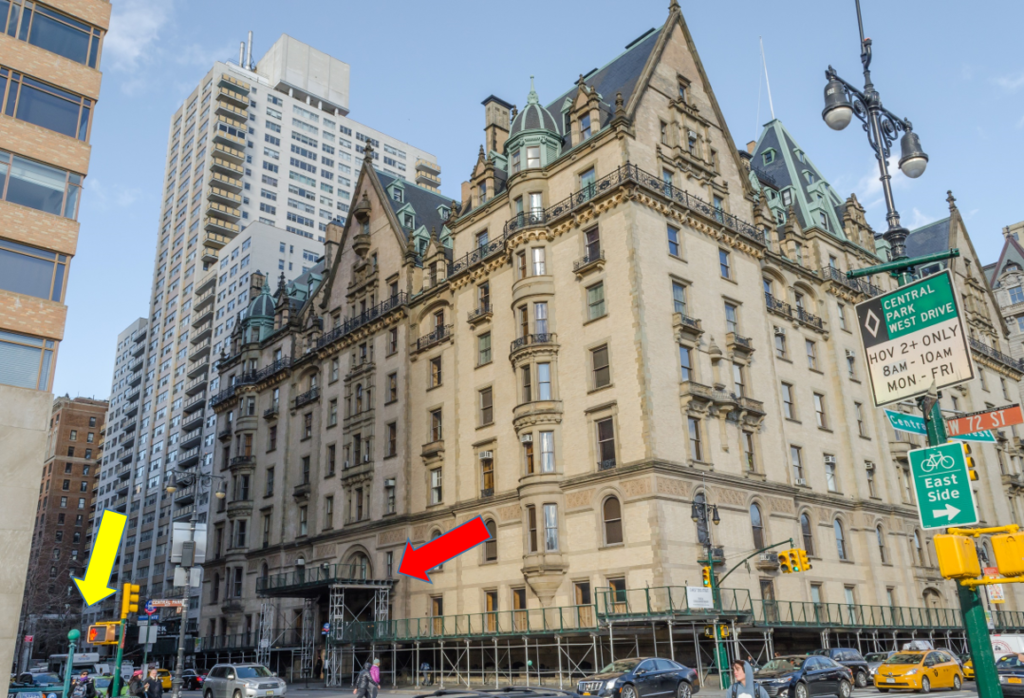 And that’s when I got lucky. On most corners of Manhattan in those days there were pay phones (yellow arrow left) And one of the phones directly across the street from the Dakota – looking right at the entrance (red arrow) of the building where Lennon was shot – was open. And I grabbed it. And held onto it.
And that’s when I got lucky. On most corners of Manhattan in those days there were pay phones (yellow arrow left) And one of the phones directly across the street from the Dakota – looking right at the entrance (red arrow) of the building where Lennon was shot – was open. And I grabbed it. And held onto it.
I made a number of calls back to Detroit – my deep knowledge of the building and John and Yoko’s life in New York City turning out to be helpful, and probably actually interesting. I may have been on the air at another ABC station or two – it was a blur.
Late morning, I returned home to shower, shave, and don my big boy clothes, and headed into 1345 Avenue of the Americas, across the street from the ABC building where our offices were located.
And most people either just said hi, or commented that I looked like I had been up all night. When I told them what I’d been doing, some were only peripherally aware Lennon had been shot and killed. It was just another day for many people in New York City, but for me, it turned out to be a seminal day in my radio career.
But their reaction (or lack of one) was a bit of a gut punch at the time. The Beatles were my favorite band. Losing Lennon – for many, the Beatle – was beyond tragic. We have sadly become accustomed to tragic rock star deaths. Even back then, rockers like Janis Joplin, Jimi Hendrix, Keith Moon, and John Bonham had already lost their lives to drugs and overindulgence. Some, like Buddy Holly and Richie Valens, had died in plane crashes.
The pace has accelerated. In recent years, we’ve lost rock icons like Kurt Cobain, Prince, Tom Petty, Freddie Mercury, Scott Weiland, David Bowie, Chris Cornell, and Glenn Frey. And while drugs were the culprit once again in some of these cases, the ravages of old age and not-so-healthy lifestyles have played a contributing role as well.
But an assassination? On the Upper West Side of Manhattan…of a Beatle?!
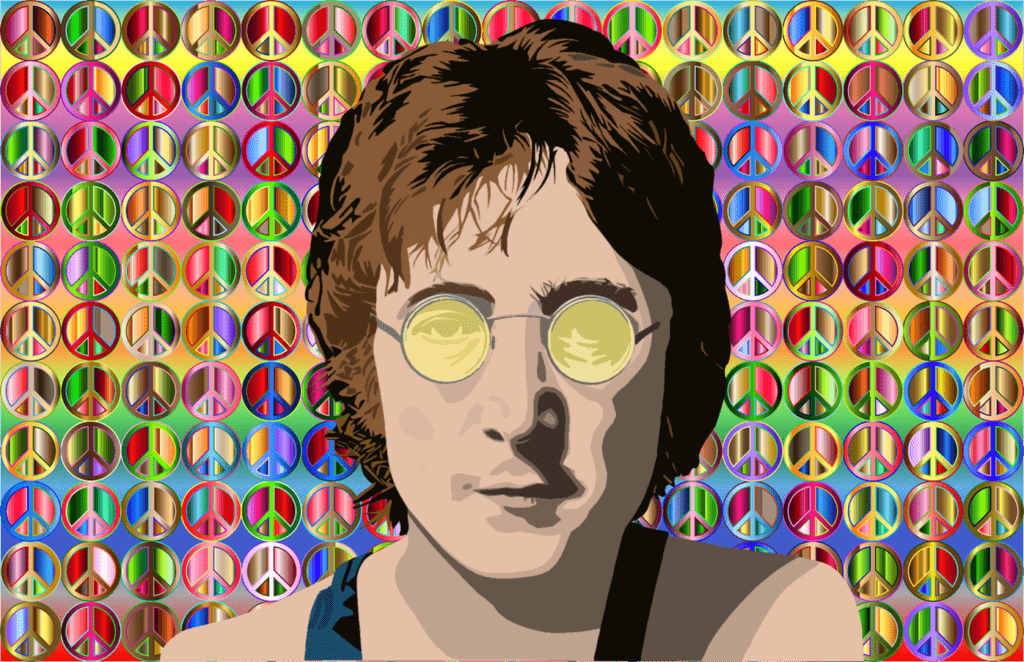 It was a huge story then. And it would be even bigger in today’s over-caffeinated, breaking news media environment. Up until that time, I had only been involved with local coverage stories in radio – snow storms and the like. The Lennon murder was the first big event that was a powerful shocker to my community of rock n’ roll.
It was a huge story then. And it would be even bigger in today’s over-caffeinated, breaking news media environment. Up until that time, I had only been involved with local coverage stories in radio – snow storms and the like. The Lennon murder was the first big event that was a powerful shocker to my community of rock n’ roll.
And for me personally, it was a galvanizing moment when I felt the adrenaline rush of being in the middle of a story that profoundly impacted a radio station and its audience. I carried the story around for weeks, especially walking past the Dakota, which rapidly became a tourist curiosity.
Those of you who were on the air during 9/11 or who have been on hand for a disaster like Katrina, a mass shooting, or a terrorism incident are likely nodding your heads. This is what radio does not only well, but in a live, real-time way no other medium can replicate.
Being a part of a story and having the opportunity to tell it to an audience is a special privilege many never experience. And holding up the mirror to grieving listeners and celebrating the life and times of one of their musical heroes is that reminder why many of us got into radio in the first place.
In the ensuing years, I do my best to make a Dakota stop when I’m in Manhattan, as well as the area of Central Park designated as “Strawberry Fields” (pictured at the top of this post). I’ve taken my kids to the see the building, and have shared this story with them.
So for old times sake, I’ll put on some Lennon today (or Alexa will), and hope to hear some of his music on the radio.
FWIW:
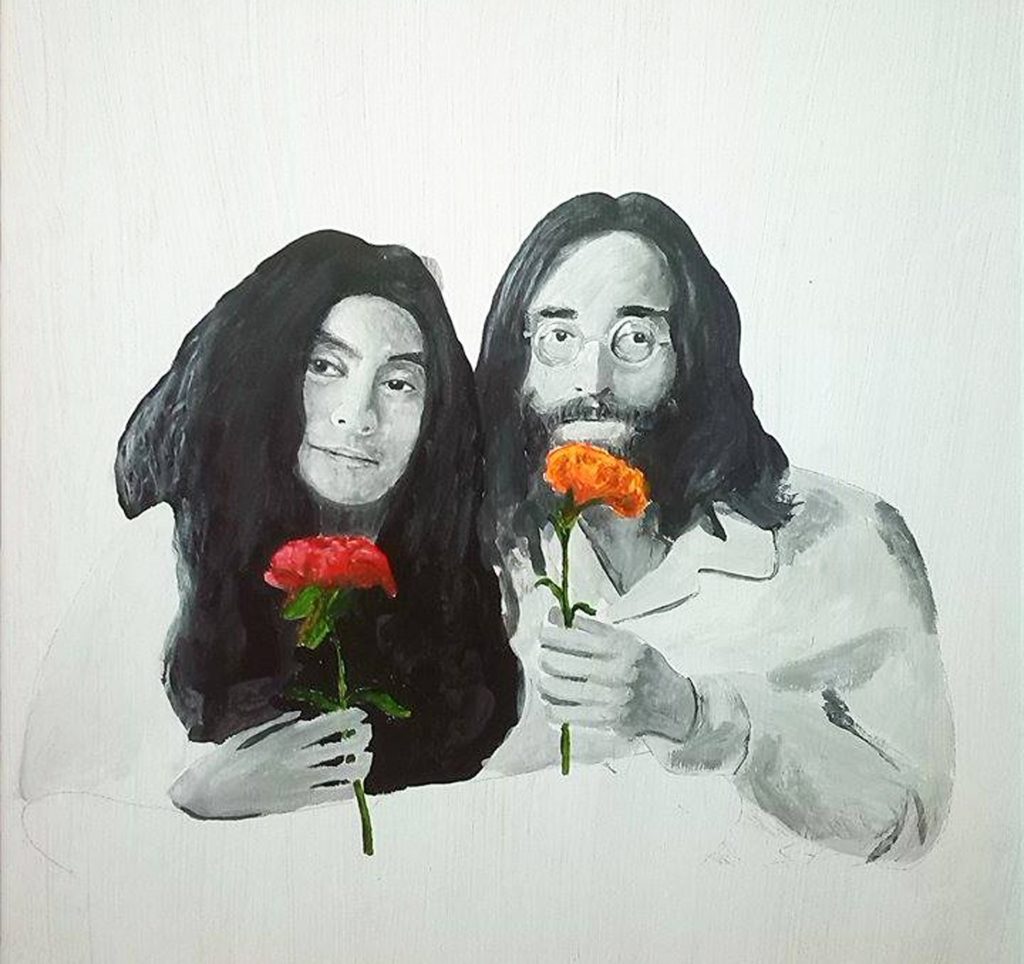 “In My Life”
“In My Life”
“Strawberry Fields Forever”
“A Day In The Life”
“Imagine”
“(Just Like) Starting Over”
“Instant Karma”
“Give Peace A Chance”
“Happiness Is A Warm Gun”
What did I miss?
I still miss John.
Postscript: The jock I called at WRIF the night of December 8, 1980, was Carl Coffey. Sadly, Carl passed away just a couple of months ago. It was truly a sweet guy who loved what he did. R.I.P. Carlton Eugene Coffey. – FJ
- Under The Influence(rs) - March 14, 2025
- Radio’s Dilemma: Trump Or Get Trumped - March 13, 2025
- What About Bob? - March 12, 2025





Thanks Fred. Still unbelievable. Sigh. Here’s a program I produced 22 years ago.
https://exchange.prx.org/pieces/54843-the-day-john-lennon-died-59-00-54-00
The Day John Lennon Died (59:00 / 54:00)
From: Paul Ingles
Length: 58:56
Music fans recall how they heard the news of John Lennon’s death in 1980, and what Lennon’s music has meant to them. Also, excerpts from an interview John and Yoko gave on the morning of the day he died. Great Lennon music too.
Thanks for contributing to this story, Paul. It touched us all.
Great post, Fred. Hard to believe how much time has passed.
That night, I had just got off my 6-10P shift up in Boston at WROR when I too heard Howard Cosell break the news.
OMG!!
The radio was a huge part of that story – and if I recall, nearly every radio station in Boston did something – from playing 100% Beatles to hourly covers on the country station and classical and jazz. It was an instant cultural communion, regardless of your primary format choice. Radio was such an important connective tissue……I sure miss that. THe concept of “Come Together” is actually quite important to us humans.
Indeed, Phil. It was a spontaneous reaction to a tragedy. Everyone was very much “in the moment,” and live & local truly meant something. On that day, it was a community, albeit a sad one.
I took my first road trip to the United States in December 1980. A friend and I drove up the East Coast from Miami, arriving in New York just a month after John Lennon was assassinated.
People were still sneaking up on the Dakota and bringing flowers of all colors to the ‘Imagine’ mosaic in Strawberry Fields.
My friend Henry, a Beatles fan, and I cried for a while next to the mosaic, and then shyly went to take a photo by the famous golden guardhouse at the entrance to the Dakota.
On the radio, back in Colombia, we had already done several tributes to Lennon, including an ‘unplugged’ with a local band playing his songs live on the radio and broadcasting the last great interview we could get hold of by Andy Peebles from the BBC thanks to the fact that we had bought the syndicated program “El Pop Británico” months before.
Undoubtedly one of the saddest days of my radio career…
I do not know how I missed the original article, thank you for reposting. I I too was watching the football game that night. May be the saddest day in Rock History.
Paul, I was on the air at a 250 watt AM station in Ada Oklahoma that night. A fellow jock called me on the private number that the GM only could use and told me the news. I immediately went on the air and informed the listeners of the tragic news and started playing Beatle music. It was just after 11pm central time when this happened and our sign off time then was midnight. I pushed the limit and stayed on til 12:30am. It was one of those radio memories I’ll never forget.
Kennedy.
Lennon.
9-11
Defining moments in our lives. 42 years later, and the grief over losing John that way is still there.
#ripJohnLennon
Ps. And if this happened today, it wouldn’t be covered (on music radio) until the next morning…yet tik tok and Twitter would be all over it.
The night John died, I was in my apartment at my first pro radio job with WSGO Oswego NY. The news flash interrupted some TV show out of Canada where a juggler was performing, then cut right back to him afterwards. In the middle of all my emotions and jumbled thoughts, one weird thought floated to the surface: watching the juggler, I wondered, “How hard can that be?” I balled up some socks and practiced until 3am (I wasn’t going to sleep that night anyway) until I got it right. I’ve always thought it weird telling folks exactly where I was and what I was doing “on that night”, but it’s all true: John Lennon – indirectly – taught me how to juggle. And 42 years later I still miss his creativity and genius.
I’ve mentioned before that Mexico City’s Universal still has the daily “El Club de los Beatles” show, along with a related online-only subchannel. However, I don’t think that I’ve already mentioned that Lima’s Radio Mágica continues to have the similar “La Hora de los Beatles”.
Fred:
Thank you for this post. As a lifetime Beatles devotee (since that fateful night in 1964 when my brother and I watched spellbound the band’s appearance on the Ed Sullivan Show), I was devastated by John’s death. I was in my first year of law school, and in the middle of first semester finals. I was fortunate to make it through them.
My first stop at the Dakota and Strawberry Fields in Central Park occurred a couple years later, as I began my career, which ultimately landed my in the music business and, later, in radio.
I don’t use the word “icon” lightly, but all would agree, I hope, that John and his bandmates deserve the title. The death of an icon is always jolting, but we generally find a way to move past it. With John Lennon, I hope never to move past it, or him and his musical and cultural legacy.
I still imagine.
Mike
Mike, I love this comment and the sentiment behind it. I know a lot of people were profoundly touched by Lennon’s death, like I was. No group has had the kind of influence on me the Beatles had – and still do today. Thanks for providing another great story to our blog.
Keep imagining,
Fred
I head the news from Howard Cossell as well watching that game on Monday Night Football. There is great 10-15 minute feature from ESPN about how ABC got that news on the game so quickly. It’s fascinating.
Fred, thank you resending this, and especially for the postscript about Carl, one of my many, many heroes via WRIF. I hate to say that while being a passionate broadcaster and total Beatlephile via my Dad, I’m grateful I wasn’t around to be on the air at the time. I could not have handled it as so many clearly did with grace. Props to all of our amazing on air talent who have had to inform and yet entertain in the hardest of times, and even more so when we lose our icons.
Great to hear from you, Lori. RIFF was an amazing place, and Carl was one of the unsung heroes who made it so.
Knowing you like “Time and Again” means I like you EVEN more. I was destroyed that day. Driving to college in the dark when it came over the radio. (the RADIO), I involuntarily was screaming NOOO! and beating up the dash board. Thanks for sharing your experience. Arriving at school in a few minutes, I too listened to BOTH of those NY stations for the same reasons that you did. Radio was key for the shared experience immediately after and into the next day.
Jim, truly appreciate this.
Glad you reprinted this. I won’t go into all my own memories of that night as I shared them when this was originally posted. But I will say your introduction caught my eye. “In some ways for me, it was the day the music died – or at least its mortality got all too real.” You could not possibly have expressed my sentiments more perfectly. How many of us even got into radio because Lennon and his bandmates made radio so wonderful and exciting? 42 years later…and I still get chills remembering that day the music truly did–my music, at least–die.
Much appreciated, David.
I don’t recall where I was or what I was doing when John Lennon was shot,but I do remember when comedian John Belushi was found dead at a local Los Angeles hotel bungalow due to a drug overdose.
I was on my way to work on a 4PM-midnight swift when it was announced over FM rocker KMET that Belushi was dead. The station immediately went to playing many Blues Brothers tunes and,I believe,phones calls from listeners sad over his death.Belushi was a popular figure on Saturday Night Live and was half of the Blues Brothers team partnering with Dan Aykroyd.
Belushi was well-loved by many in my generation. He was just a manic presence in everyone lives. I was not a big fan of his,but on reflection,he bought a new generation a new love of his kind of comedy.
He was a force of nature, which is why you remember that day. Thanks for commenting.